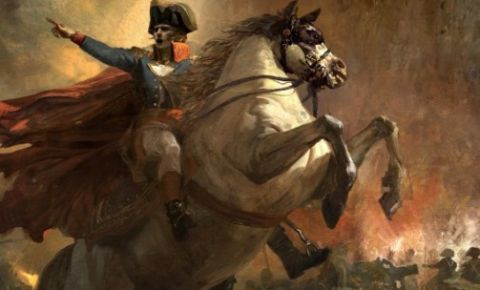There are strategy games and there are grand strategy games. Did you feel a sense of power when you built that massive, almost 50-unit strong army in Command & Conquer 3 and took down the last Scrin tower? Did you envision yourself as a great field commander when you led that hundred strong TEC fleet to crush the Vasari resistance in Sins of a Solar Empire? Every game we play instills a feeling of power in any of us and that feeling is arguably stronger when we not only command our game avatar, but when we lead masses of soldiers, ships or tanks into battle. They say all soldiers carry in their backpacks a field marshal's insignia. It is equally clear that all gamers carry in their CD and DVD cases the full regalia of kings. Why kings? Because history hasn't recorded any other position of power from which a man can better direct the destinies of other men.
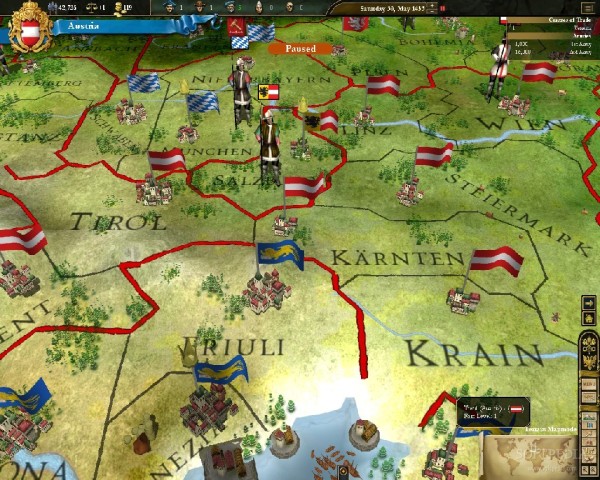
Concept
Well, the games industry has gone one better on history by letting a player be more than a king. In Paradox Games' Europa Universalis series, the player is the immortal authority behind the throne, the hand that shapes the way Europe and the world develop over the centuries. In Europa Universalis, the world bends to your will, whatever that might be.
The Europa Universalis series has built its reputation on solid historic-centered real-time engaging gameplay. As the name of the grand strategy game suggests, the game is concerned with everything that happens to the world from 1453 to 1820. You, the player, take control of a country and guide it through the ages towards the historical finish line. You can actually scroll the months in the country selection screen and watch how the map of the world changes in time, with old empires disappearing and new challengers emerging almost every year. All the state-like entities that existed between 1453 and 1820 are fully playable, from the nomadic Indian tribes in North America to the isolated Japanese Empire across the world. As an immortal guide of your country's destiny, you can control everything from military recruitment and wars to the religious choices of your citizens and the tax rates in your provinces.
The game is an RTS at heart, which means no turns. The "Pause" button is going to be a best friend of new players, who should also note that there are varying speed settings to make it easier to get through the tedious moments while keeping control when need arises.
This is the number 3 game in the Europa Universalis series and is built from the ground up on a new graphic engine and on new gameplay concepts. The Napoleon's Ambition expansion, released on October 23, 2007, is based upon the same game engine, but brings about scores of improvements related to the game experience. More events are available, kings and advisers can arrive at the historical date, a few gameplay mechanics have been revisited and several balance issues have been tweaked.
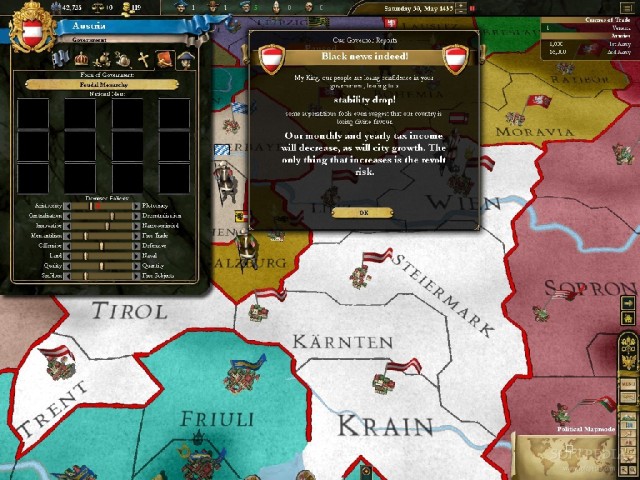
Gameplay
The main areas in the game are nation management, trade, diplomacy, research and, of course, war. Each of them is equally important to the fate of your chosen nation and none can be disregarded. A player that pursues war without full coffers and a lead in technology is a trader nation that does not prepare for a few skirmishes.
Most players differentiate between major in-game powers and minor powers, mostly referred to as "majors" and "minors". Major powers offer ample resources, in the form of money, manpower and provinces, but also pose greater strategic challenges. Minor powers are not incapable of becoming great powers, but they face more serious issues like a severe lack of money and/or manpower. The most interesting games I've had were with Austria, Brandenburg, France, England, Spain, the Ottoman Empire and the Ming. Mileage may vary. Contrary to popular belief, some people might find it more enjoyable to play a country with little to no conflict. If that's your thing, look for a nice minor province with a trade center and play it.
Whatever country you choose, you can have full control over it by pressing the country coat of arms in the top left corner of the screen. One of the most important elements here are the country sliders. Through them the player shapes the nation he is playing, by deciding where he stands on different issues. Do you side with the nobility or the merchant elite? Do you want a centralized or decentralized state? An offensive or a defensive military? Each position comes with advantages and disadvantages that a player can mix and match. From the same panel, you'll later be able to choose National Ideas, that better define your country's focus in the world. Some 17 types of government are available, from Constitutional Monarchy to Administrative Republic and Revolutionary Empire.
On a nearby tab, the player deals with finances. No country in the game has a perfectly balanced budget. There are a few ways to get money and which is appropriate depends on location, number of provinces, relative wealth of those provinces and form of government. There are monthly taxes levied and there are annual taxes. It's better to rely on the latter and send as little as possible of the former to the treasury to help tackle inflation, which makes all in-game prices rise. There are also trade revenues, but most major countries cannot compete with the minors in trade efficiency. You can also get money as part of a peace resolution after a successful war. Feel free to play around with the sliders in the economy section to see what's right for you.
One of the main elements of the game is research. You invest in each branch (Land, Naval, Government, Trade, Production) as much as you want and they bring different bonuses. Government tech will allow you to choose National Ideas, sets of concepts also divided into areas that grant further bonuses and restrictions. Some boost the morale or your armies or grant you manpower, while others let you research faster or be more tolerant. Land and Naval tech grant access to new units while Trade tech makes you more competitive.
Trade can be quite important in the game, especially as a small nation. Dotted around the map are Centers of Trade, where historically people used to massively engage in commerce. Maybe the most important ones are in Venice and L?beck early on. Each nation sends merchants to these centers and a variety of factors, from stability of the country to trade tech, determines who is competed out and who remains in the CoT to reap the trade benefits.
Diplomatic moves are crucial to succeeding in Europa Universalis III: Napoleon's Ambition. The array of options is more than the usual RTS player is used to. You can marry into a royal family, hoping to inherit their lands, but then you risk a succession war. You can enter a trade agreement with another country, agreeing to eliminate competition between the respective merchants, but this hurts your prestige as a nation. You can offer alliances, ask and offer military access. And, if certain conditions are met, you can vassalize and then diplomatically annex a country.
War is just an extension of politics by other means, as Clausewitz would put it. And war in EU III: NA is no different. Total conquest is rarely feasible. And most of the time, the player won't need it. Each time you acquire, by force or diplomacy, a province, you acquire greater "bad boy", of which we'll speak latter. In war, more important than outright contest is to destroy the enemy armies in the field and lay siege to its provinces. Based on the success of the war, a "war score" is generated and determines what you can ask for in the peace settlement. The options are again bewildering, from asking the country to become a vassal and adopt your religion, to simply asking for some money and a truce.
At the heart of the game, there are two concepts that require quick explanations: bad boy and prestige. A country acquires bad boy when it behaves outside of the norms of conduct for the period. The player gets bad boy when he gets a new province, when he breaks peace treaties, when he declares being on a country which has the same religion. And if sufficient bad boy is acquired, nations tend to declare war in quick succession on the player. This mechanic is designed to slow down expansion and create a situation where a conquest war is not a good option. On the other hand, prestige charts how courtly a country is. It is gained when successful diplomacy is conducted and when alliances are honored. Each increase in prestige rises the country's standing amongst its peers.
One of the most impressive feats of the new game engine is randomization. Previous Europa Universalis games featured historical rulers and generals and the replay value was limited because of this. EU III: NA generates leaders and generals based on the situation of the country at the moment of succession and on other variables. There's still the option for historical leaders, but I feel it limits the possibilities of the game too much. Apart from leaders, events are often thrown at the player. They can range from peasant wars and challenges from the nobility to discoveries of distant lands or tech-related breakthroughs. They are related to the current actions of the player and the way his country is developing, so they never feel out of place and they provide fresh challenges.
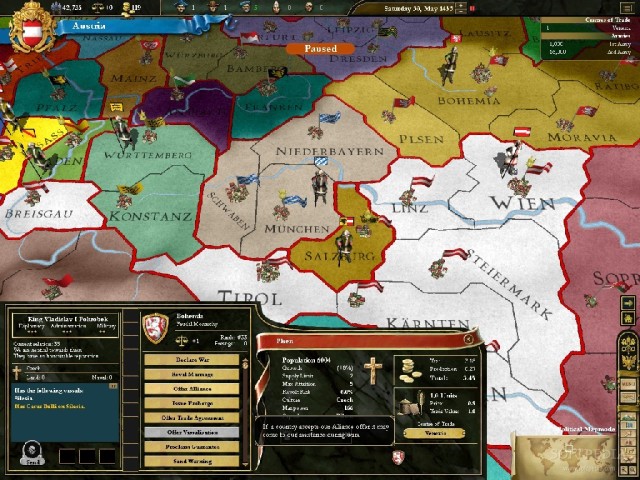
Visuals and audio
There are a few things we should get out of the way as soon as possible. The game is not beautiful in the way that Crysis can be beautiful. Although Paradox executed a move to 3D with this game, the map is more prone to being called "functional". Together with the rest of the interface, it delivers, in an intuitive manner that's nicely covered by the game tutorials and by the manual, most of the information the player wanted without the need for digging. There are four view settings available: terrain, political, religious, trade and diplomacy. When you play a nation of the Holy Roman Empire, you also get an imperial view.
On the top bar, you can see the number of spies, colonists, diplomats and bishops that your country has, while also receiving information about the stability of the country and its finances. When something important about your empire happens, like going into debt, going to war or needing to replace an adviser, an icon will appear just below the top bar. Such alerts are very useful, considering the amount of information a player has to handle. Diplomatic alerts, received when another country makes an offer, appear at the bottom of the screen. On the right, there's a handy listing of all your military assets, while on the bottom of the screen you can see important messages regarding the other countries in the game. Be advised that almost all the values displayed are broken down further by a tooltip, if you only let the mouse hover.
Clicking on an owned province brings up a province view where you can see the provincial information, you can initiate builds and recruit armies while clicking on a province you do not own, lets you see the details of the province while providing you with a list of diplomatic options in relation to the owner.
Also, the sounds in the game are mostly basic and functional. The music score, however, is particularly well done, with sweeping themes designed to convey a sense of historic greatness. It's also nice that the music has been customized for different sections of the game. At times, it still can get a little repetitive, especially in the longer games when you go past the 1700s.
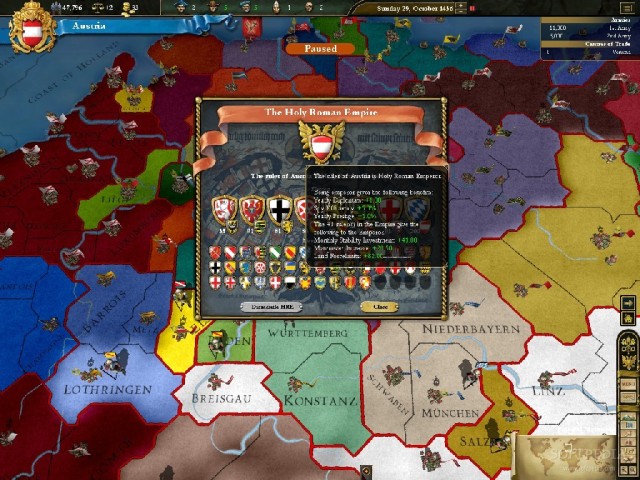
Multiplayer
The multiplayer game is now extremely impressive. Apart from the usual fair of multiple gamers playing different countries in order to see who'll survive and who will fail by 1820, the only other interesting element is that a co-op mode exists, where two or more players can control the same country game.
Other than that, players should know that multiplayer sessions can be time consuming and that the community hosts games and provides a lot of tips on the Europa Universalis forums.
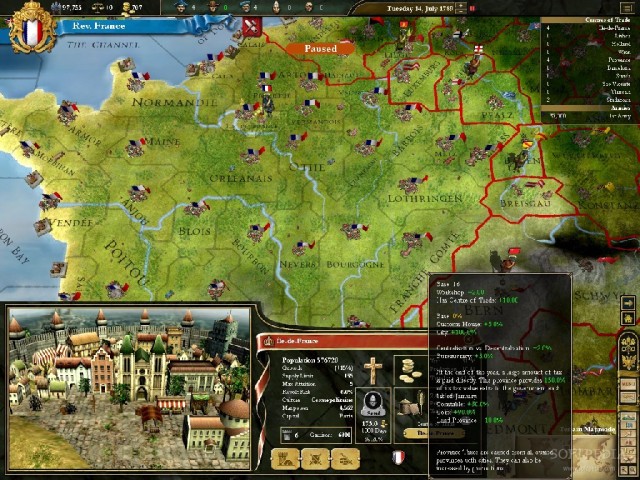
Conclusion
No review can cover the amount of content available in Europa Universalis: Napoleon's Ambition. Colonies and colonial wars are important later in the game, piracy plays an important role in the Mediterranean, the Holy Roman Emperor is more than just a simple figurehead and there are more aspects that a player can discover while playing the game. The enemy AI is competent at keeping you at bay and can cook up some nasty surprises.
Although the learning curve seems a bit steep for the uninitiated player, after a few hours in the game most of the aspects will be clear. When questions appear, it is worth noting that the on-line community centered around the game is helpful and quite informed of the inner workings of the game. It can be found here.
So, if you want to lead a country, recruit armies, steer diplomacy, convert pagans, spy on enemies, colonize the Americas or rule over Europe, go out and give Europa Universalis III: Napoleon's Ambition a try. You won't be disappointed.
 14 DAY TRIAL //
14 DAY TRIAL // 